From Korean Nightlife to Shooting Stars: An English Teacher’s Adventures in Busan

“There! Back there!” I cry. “There was a little road.”
Josh makes a swift u-turn, throwing me against the door. I chirp in alarm at his driving techniques, and sit forward to grip the sides of Brian’s seat. The headlights sweep along a line of trees as Josh turns left onto a small road, almost completely hidden from view by the darkness and the sharp curve of the road. Other cars drive past us, heading along the perimeter of the national park.
Josh slows the car to a crawl and we look hopefully into the brightly lit trees.
“It just looks like a drop-off,” I mumble sadly at the steep mountainside. What we need is flat ground.
We slowly sweep around to the far corner of the gravel path.
“Ahhh,” Josh sighs happily. In front of us stands a two-story pagoda, surrounded by trees, sheltering a patch of ground underneath it from the rain. A perfect camping spot.
We are in Jirisan National Park, home of the tallest peak on mainland South Korea at 1,915 meters, or 6,283 feet. The trunk of the car is packed with tents and sleeping bags. The rain pelts against the windshield and the mid-October air hints at the chill yet to come in winter. I don’t want to be anywhere else.
For many, coming to Korea as an English teacher is a sweet deal: free rent, a good salary, and cheap booze. For some of us in the cities, our lifestyle can feel like an extended year of university. School gets out and foreign teachers rendezvous at any place with cheap beer on tap. Bars stay open until the last customer leaves, taxis are cheap, and even school colleagues accept—even encourage—excessive drinking.
When I arrived in Busan, the thrill of a new relationship and friendships, and feeling obligated to meet as many people as possible led me to the bars. It’s just what you did. Nights were late, and Saturday mornings were filled with soju headaches. I felt like if I didn’t go out then I’d be missing out. Turns out, I wasmissing out on a more exciting kind of life.
Two and half years later, the lure of foreigner bars has lost its hold on me. My friends and I choose the corner hole-in-the-wall restaurant, stuffing ourselves with greasy pajeon and milky, refreshing makkoli (unfiltered Korean rice wine). It’s hard to remember that year when I spent too much time slugging back Cass beer in a cramped smoky bar. Instead, I remember when I windsurfed, when I hiked past an island temple at night, and when I shivered beneath shooting stars while camping in a park.
But it took me too long. I wish someone had smacked me on the head. The fear of missing out on some hilarious night, on meeting even more and more friends, made me do just what every other teacher in my situation had done before. I lost my sense of adventure for the comfortable, because in a foreign land it’s easy to choose comfort; maybe you’re homesick or you can’t take the frustration of working with the rules of this new culture. And a bar full of Americans (or Brits, or Aussies) beacons you in.
Josh and Bryan race up the trail, squeezing past the slower lines of tour bus hikers. I’m following behind, breathing hard, cursing these stubborn boys who don’t like to slow down. I refuse be the weak hiker. I continue up, up, up, my calves aching after each rocky foothold.
Korean trails lack switchbacks, meaning that instead of crisscrossing the face of the mountain for a gradual ascent, the trail goes up a straight line, from start to peak, for an exhausting climb. We calculated on Bryan’s GPS that for every meter we went forward horizontally, we climbed three vertically.
Korea is 70% mountainous, with miles and miles of (highly used) hiking trails. Even in the city, somewhere nearby there is a hill to climb, and trees to give you a fresh breath of air. Go outside the cities, and a new face of the country is there to greet you: green rice fields, small rugged islands, friendly drivers willing to pick up hitchhikers, and views of jagged rock towering above you. You won’t ever find true wilderness here (it’s a small, highly populated country), but you will find climbable mountains and enough trees to filter out the city pollution from your lungs.
At last, the tree line drops away and the peak is in sight, still at least an hour away. The air temperature drops quickly and slices into my lungs as I inhale with difficulty. The wind whips through our light jackets. Below us, ridges of smaller mountains crumple into mounds like tissue paper. Squinting, I can see some buildings in the distance, the park’s visitor center. Otherwise, it’s only us and the trees, mottled with the oranges and reds of autumn. A blanket of grey clouds rolls over the peak.
“It’s going to be so worth it,” I grumble, attempting optimism, pulling the hood of my windbreaker down towards my nose. Josh drops some peanuts into my hand, and I eat gratefully. We move on. My legs are tired and my fingers are cold. I share this mountain with a few hundred other hikers. But I am on top of a mountain, in a foreign country, which I’ve come to call home. And I am happy.
Read more about Marisa’s travels here: http://risaroe.wordpress.

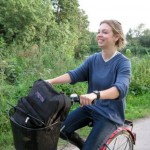
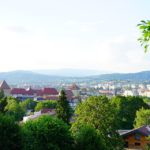
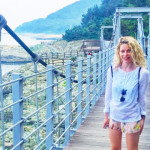
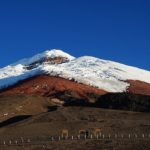


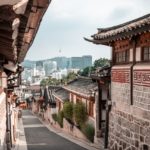

Hi Elizabeth!
I think the best way to start about doing outdoorsy things in Korea is to find a group of like-minded expats. Finding a group will help you get oriented in the country, provide information that is hard to find in English on the internet, and may introduce you to people who already have a car and things like camping gear, etc. Korea has some very active meetup.com and facebook groups for hiking, climbing, SCUBA diving, etc.
I met my friend with the car through couchsurfing.org (I stayed with him when I traveled around Korea this summer, and now we are close friends). However, for the last two and a half years I’ve gotten to all my hiking destinations by bus. Hiking is SO popular here, so there are ways… It helps if you can speak some Korean (for directions, or hitch hiking to the start of a trail).
A rural area might be the place for you, but remember even if you live in a city, it is extremely easy to leave for the weekend– buses are cheap and frequent. Also, since Korea is a mountainous country, even if you live in a city chances are you can see a mountain from your window.
Good luck, wherever you end up! I love Korea, I hope you can get out and explore.
Cheers,
Marisa
It’s so good to know there are attainable adventures beyond city life as an expat. I’m going to be teaching in Korea in August, and I’ve looked into rural areas specifically because I want the chance to explore what you’ve described here. Thank you; it sounds beautiful.
One question, though: How are you able to get to those trails? In this post you’re riding in a car…I’m just wondering how easy it would be to go somewhere for a weekend hike or camping trip without access to a car.